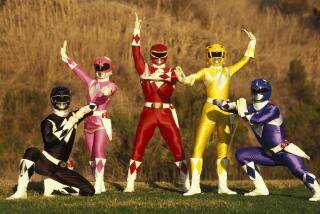CALABASAS : Lone Ranger Still Riding a Happy Trail
- Share via
Certain notions are set in granite in the view of Clayton Moore, alias the Lone Ranger: The good guys always wear white hats, fight for what they think is right and, above all, see to it that justice prevails.
“I’ll always wear the white hat,” Moore said. “The white hat has always been the symbol of justice, fair play and honesty.”
Moore, who turned 80 Wednesday, said he has no regrets and would live his life all over again the same way.
He is long retired, but still relishes the idea that in the public mind, Clayton Moore will forever be the Lone Ranger, the masked crusader who always ended his long-running television show with the famous cry “Hi-yo Silver!”
Moore said that these days, people often don’t recognize him as the masked man. But as soon as they hear his voice, they make the connection.
“They say, ‘I know that voice, I know that voice, you’re the Lone Ranger!’ ” he said Wednesday during a telephone interview from his Calabasas home.
“They can call me the Lone Ranger any time they want,” he added. “I love it. The Lone Ranger character was a great person to portray.”
At the end of each episode, the Lone Ranger would ride off into the sunset, before anyone he had helped had a chance to thank him.
Today Moore, in a seeming parody of that mysterious masked man, values his own privacy.
A party to celebrate his birthday Wednesday was to be a private affair, he said, brushing off a reporter’s questions about where it would be held and who would attend. Moore’s publicist also warned against asking questions about the masked man’s personal life or business matters relating to his career as the Lone Ranger. Moore turned down requests for face-to-face interviews and would not allow photographers.
“I’m retired from that,” he said. “I’ve done all my personal appearances.”
Moore first appeared as the Lone Ranger on television in 1949. He left the show, then returned from 1954 to 1957. After that, he continued to portray the Western hero in personal appearances. But Wrather Corp., which owned the rights to the character, wanted to make a feature movie about the Lone Ranger and in 1979 obtained a court order preventing Moore from portraying the character.
The movie flopped and Moore fought in court to regain the right to portray the hero. Finally in 1984, Wrather agreed that Moore could appear in public in dark, masked-shaped sunglasses in place of the black mask.
He was born Jack Carlson Moore, the son of a real estate broker, in Chicago on Sept. 14, 1914. He performed in a trapeze act in the circus for several years and first appeared in films in 1938, playing bit parts.
A longtime fan of the Lone Ranger radio show, Moore tried out with 75 other actors for the TV version. When told by producer George Trendle that he had the part, Moore replied: “Mr. Trendle, I am the Lone Ranger.”
Jay Silverheels, who played his Indian sidekick, Tonto (and who died in 1980), was “a good friend on the screen as well as off the screen,” Moore said.
Asked how he remains so idealistic in today’s problem-plagued world, Moore said: “I love my country. We have a great country. We should always work to preserve law and order, fair play and honesty.”
More to Read
Sign up for Essential California
The most important California stories and recommendations in your inbox every morning.
You may occasionally receive promotional content from the Los Angeles Times.













